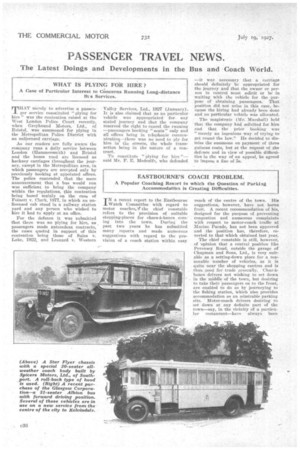PASSENGER TRAVEL NEWS.
Page 58

If you've noticed an error in this article please click here to report it so we can fix it.
The Latest Doings and Developments in the Bus and Coach World.
WHAT IS PLYING FOR HIRE?
A Case of Particular Interest to Concerns Running Long-distance Bus Services.
THAT Merely to advertise a passenger service constituted ". plying for hire" was the contention raised at the West London Police Court recently, when Greyhound Motors, Ltd., of Bristol, was summoned for plying in the Metropolitan Pollee District with an unlicensed carriage.
As our readers are fully aware the company runs a daily service between London (Hammersmith) and Bristol and the buses used are licensed as hackney carriages throughout the journey, except in the Metropolitan area, in which passengers are accepted only by previously booking at appointed offices. The police contended that the mere announcement that a bus would run was sufficient to bring the company within the regulations, this contention being based mainly on the case of Foinett v. Clark, 1.877, in which an unlicensed cab stood in a railway station yard and any person who wished to hire it had to apply at an office.
For the defence it was submitted that there was no plying for hire, as passengers made antecedent contracts, the cases quoted in support of this contention being those of Sales v. Lake, 1922, and Leonard v. Western
Valley Services, Ltd., 1927 (January). It is also claimed that as no particular vehicle was appropriated for any stated journey and that the company reserved the right to cancel the running —passengers booking " seats " only and all offices being in telephonic columnnicatioti—there was no need to ply for hire. in the streets, the whole transaction being in the nature of a contract.
To constitute "plying for hire "said Mr. F. E. Aledcalfe, who defended
—it was necessary that a carriage should definitely be appropriated for the journey and that the owner or person in control must solicit or be in waiting with the vehicle for the purpose of obtaining passengers. That position did not arise in this case, because the hiring had already been done and no particular vehicle was allocated.
The magistrate (Mr: Marshall) held that the company had solicited for hire and that the prior booking was "merely an ingenious way of trying to get round the law." He decided to dismiss the summons on payment of three guineas costs, but at the request of the .defence and in view of possible difficulties in the way of an appeal, he agreed to impose a fine of is.












































































































